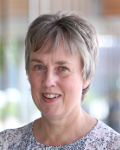For general enquiries, please email the School of Education and your enquiry will be passed to the appropriate person.
If you know the person you wish to contact, please use the list below to find their details and contact them directly. As our hybrid working model combines working on campus and at home, please
contact via email instead of telephone.

Diane Dalby
Assistant Professor, Faculty of Social Sciences
Contact
Biography
I joined the Centre for Research in Mathematics Education in September 2014 after three years as a full-time doctoral student in the School of Education, having spent much of my life in Further Education colleges as a mathematics teacher and later as a senior manager. Although my career commenced in secondary schools, the progression into Further Education broadened my view of post-16 provision and provided valuable experience across the academic, vocational and adult strands of post-compulsory education. During this time I held a number of departmental and cross-college management positions involving responsibilities for curriculum development, policy implementation, quality improvement and student support.
I have also been active as an educational consultant, trainer and external examiner for many years, taking a special interest in post-16 mathematics teaching and FE management. This has included work on national initiatives such as the Skills for Life Quality Initiative and acting in an advisory capacity for research projects or national developments, for example as a member of the Managing Core Maths Advisory Board and the ACME Community of Interest.
Teaching Summary
My teaching interests lie mainly in teacher education, particularly with respect to PGCE courses and other professional training, due to my work as an external examiner and involvement in… read more
Research Summary
My main research interests stem from my background in Further Education as a mathematics teacher and college manager. These include the teaching of disaffected and low-attaining students, the… read more
My teaching interests lie mainly in teacher education, particularly with respect to PGCE courses and other professional training, due to my work as an external examiner and involvement in professional development over many years. I have worked as a tutor on the PGCEi course for the last four years with the Singapore cohorts. Having also travelled and observed mathematics teaching in Europe and Africa, I have a particular interest in the roles and values of teachers in different cultural settings and how this affects their teaching of a subject such as mathematics.
Current Research
My main research interests stem from my background in Further Education as a mathematics teacher and college manager. These include the teaching of disaffected and low-attaining students, the enactment of policy in FE and the post-16 mathematics curriculum. My doctoral research focused on the experiences of vocational students learning functional mathematics in Further Education colleges and how different factors arising from policy, curriculum and classroom practice affected their attitudes and understanding.
Since then I have worked on several research projects in mathematics education, including the Nuffield-funded project Mathematics in Further Education Colleges (MiFEC). This project used a multi-scale approach to investigate the national policy landscape for mathematics in FE, patterns of learner engagement over time, college level policy enactment, teacher workforce skills and student learning of mathematics in vocational contexts. A series of four interim reports are now available, in addition to the final report published in October 2020. These can be found at https://www.nottingham.ac.uk/research/groups/crme/projects/mifec/index.aspx.
I am currently working on the Centres for Excellence in Maths programme, funded by the DfE, which aims to improve outcomes for students in Further Education Colleges who are retaking GCSE mathematics.
Other recent projects include:
- Effective practice in the delivery and teaching of English and mathematics to 16-18 year olds (DfE). The final report provides examples of successful approaches to the management and teaching of students in Further Education colleges who have not yet achieved a satisfactory GCSE grade in English and/or mathematics.
- The Mascil project (Mathematics and Science for Life). This EU-funded project involved 14 countries and aimed to promote the use of inquiry-based teaching and connections to the world of work in mathematics and science classrooms. See http://www.mascil-project.eu/ for the main project site and http://www.mascil-project.eu/professional-development/teacher-pd-toolkit for the professional development toolkit that supports this project.
- The FASMEd project (Improving progress for lower achievers through Formative Assessment in Science and Mathematics Education). This EU-funded project involved 8 countries and 9 partners. The project aimed to research the use of technology in formative assessment classroom practices in mathematics and science. See https://microsites.ncl.ac.uk/fasmedtoolkit/ for the teacher toolkit for this project.
- Mathematics in the successful technical education of 16-19 year olds. This project was funded by the Gatsby Foundation and involved a comparative study of mathematics in technical education for a small sample of countries with in Europe and the Pacific rim. The final project report can be found at http://www.gatsby.org.uk/uploads/education/reports/pdf/maths-in-international-systems.pdf.